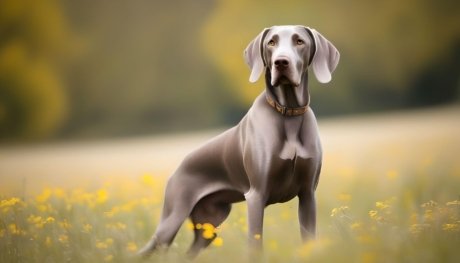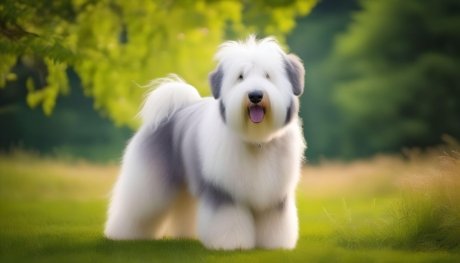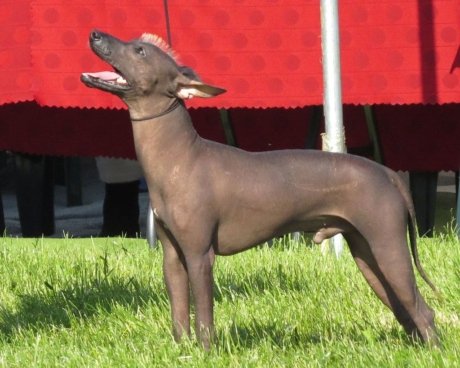Portuguese Water Dog | Breed Information, Prices, 10 Facts, Care Tips, Health
The Portuguese Water Dog, also known as the “Cão de Água” in Portugal, is a unique and beloved breed with a fascinating history. From its role as a fisherman’s companion to its hypoallergenic coat, this breed holds a special place in the hearts of dog enthusiasts. In this article, we’ll explore the key aspects of the Portuguese Water Dog, making it an ideal read for potential owners and dog lovers alike.
Portuguese Water Dog
The Portuguese Water Dog, often referred to as the “Portie,” is a unique and intelligent breed known for its exceptional swimming abilities and friendly temperament. This versatile canine has a fascinating history and a range of qualities that make it a sought-after companion for dog lovers worldwide.
The Portuguese Water Dog’s origins can be traced back to Portugal, where it was initially bred for the purpose of assisting fishermen. These dogs were trained to work on fishing boats, helping with tasks like retrieving nets, delivering messages between ships, and even herding fish into the nets. Their webbed feet, robust swimming abilities, and strong work ethic made them invaluable to Portuguese fishermen.

Portuguese Water Dogs are characterized by their distinctive appearance. They have a curly or wavy coat that is often hypoallergenic, making them an excellent choice for individuals with allergies. This breed comes in two coat varieties: one with tight, dense curls and the other with wavy, more loosely curled fur. Their expressive, round eyes and expressive faces give them a friendly and approachable look.
These dogs are known for their friendly, outgoing, and playful nature. They are highly adaptable and make excellent family pets. Portuguese Water Dogs are loving and loyal, forming strong bonds with their owners. They are also highly intelligent and eager to please, which makes them easy to train. However, they can be quite independent, so consistent and positive reinforcement-based training is essential.
Exercise and Activity
Portuguese Water Dogs have a lot of energy and require regular exercise to keep them happy and healthy. Their swimming ability makes them particularly fond of water-related activities, but they also enjoy playing fetch and running. If you live near water, providing opportunities for them to swim can be especially rewarding.
Grooming
Grooming a Portuguese Water Dog can be quite an undertaking due to their curly or wavy coat. Regular brushing is essential to prevent matting, and many owners opt to trim their fur to make grooming more manageable. Their hypoallergenic coat is a significant advantage for those with allergies, but it still requires care to prevent tangles and matting.
Health and Longevity
Portuguese Water Dogs are generally a healthy breed, but like all dogs, they can be prone to certain genetic health issues. Hip dysplasia, progressive retinal atrophy, and certain heart conditions are some of the concerns to watch out for. With proper care, a Portuguese Dog can have a lifespan of around 10 to 14 years.
Portuguese Water Dog Characteristics
Here are some common characteristics of the Portuguese Water Dogs:
| Characteristic | Description |
|---|---|
| Origin | Portugal |
| Size | Medium to Large (Male: 20-23 inches, Female: 17-21 inches) |
| Weight | 35-60 pounds |
| Coat Type | Curly or Wavy, Hypoallergenic |
| Temperament | Friendly, Outgoing, Playful, Loyal |
| Intelligence | Highly Intelligent, Easy to Train |
| Exercise Needs | High; Loves Swimming, Playing, Running |
| Grooming Requirements | Regular Brushing, Potential for Trimming |
| Health Concerns | Hip Dysplasia, Progressive Retinal Atrophy, Heart Issues |
| Lifespan | 10-14 years |
Portuguese Water Dog Puppies
Portuguese Water Dog puppies are known for their irresistible cuteness and playful nature. When adopting a Water Dog puppy, it’s important to ensure that you choose a reputable breeder who prioritizes the health and well-being of the puppies. Early socialization and positive reinforcement training are essential to mold them into well-behaved and well-adjusted adults. These puppies require proper grooming and regular exercise to keep them healthy and happy.

Mini Portuguese Water Dog
The term “Mini Portuguese Water Dog” typically refers to smaller versions of the standard Portuguese Water Dog. It’s important to note that the Water Dog is a medium to large breed, and there is no officially recognized miniature version. If you come across breeders advertising “mini” Portuguese Dogs, exercise caution and verify the legitimacy of the breeding operation, as this may be a marketing ploy. Always opt for responsible breeders who adhere to breed standards and prioritize the health of the dogs.
Portuguese Water Dog Poodle
The Portuguese Water Dog Poodle mix, often referred to as a “Portuguese Water Dogoodle” or “Portie-Poo,” is a hybrid breed that results from crossing a Water Dog with a Poodle. These dogs inherit traits from both parent breeds. They are typically intelligent, hypoallergenic, and have wavy or curly coats. Due to their mixed heritage, their appearance and temperament can vary, but they are generally friendly, loyal, and make excellent family pets. Grooming needs may depend on which parent’s coat they inherit, and they require regular exercise and mental stimulation to thrive.

Spanish Water Dog Vs Portuguese Water Dog
Here are some differences and comparision between Spanish Water Dog and the Portuguese Water Dog:
| Characteristic | Spanish Water Dog | Portuguese Water Dog |
|---|---|---|
| Country of Origin | Spain | Portugal |
| Size | Medium (Male: 17-20 inches, Female: 15-18 inches) | Medium to Large (Male: 20-23 inches, Female: 17-21 inches) |
| Weight | 30-50 pounds | 35-60 pounds |
| Coat Type | Curly or Wavy, Typically Single Coat | Curly or Wavy, Typically Single Coat |
| Temperament | Energetic, Intelligent, Loyal, Friendly | Friendly, Outgoing, Playful, Loyal |
| Intelligence | Highly Intelligent | Highly Intelligent |
| Exercise Needs | High; Requires Regular Exercise | High; Enjoys Swimming, Running, Playing |
| Grooming Requirements | Regular Brushing, Minimal Shedding | Regular Brushing, Hypoallergenic, Potential for Trimming |
| Purpose | Herding, Hunting, Water Work | Water Work, Fishing, Companionship |
| Health Concerns | Generally Healthy, Eye Issues | Hip Dysplasia, Progressive Retinal Atrophy, Heart Issues |
| Lifespan | 12-15 years | 10-14 years |
Portuguese Water Dog Colors
Portuguese Water Dogs, renowned for their intelligence, loyalty, and exceptional swimming abilities, come in a range of beautiful coat colors. The coat color of a Portuguese Dog can vary, adding to their charm and individuality. In this article, we will explore the different colors you might encounter in the world of Portuguese Dogs.
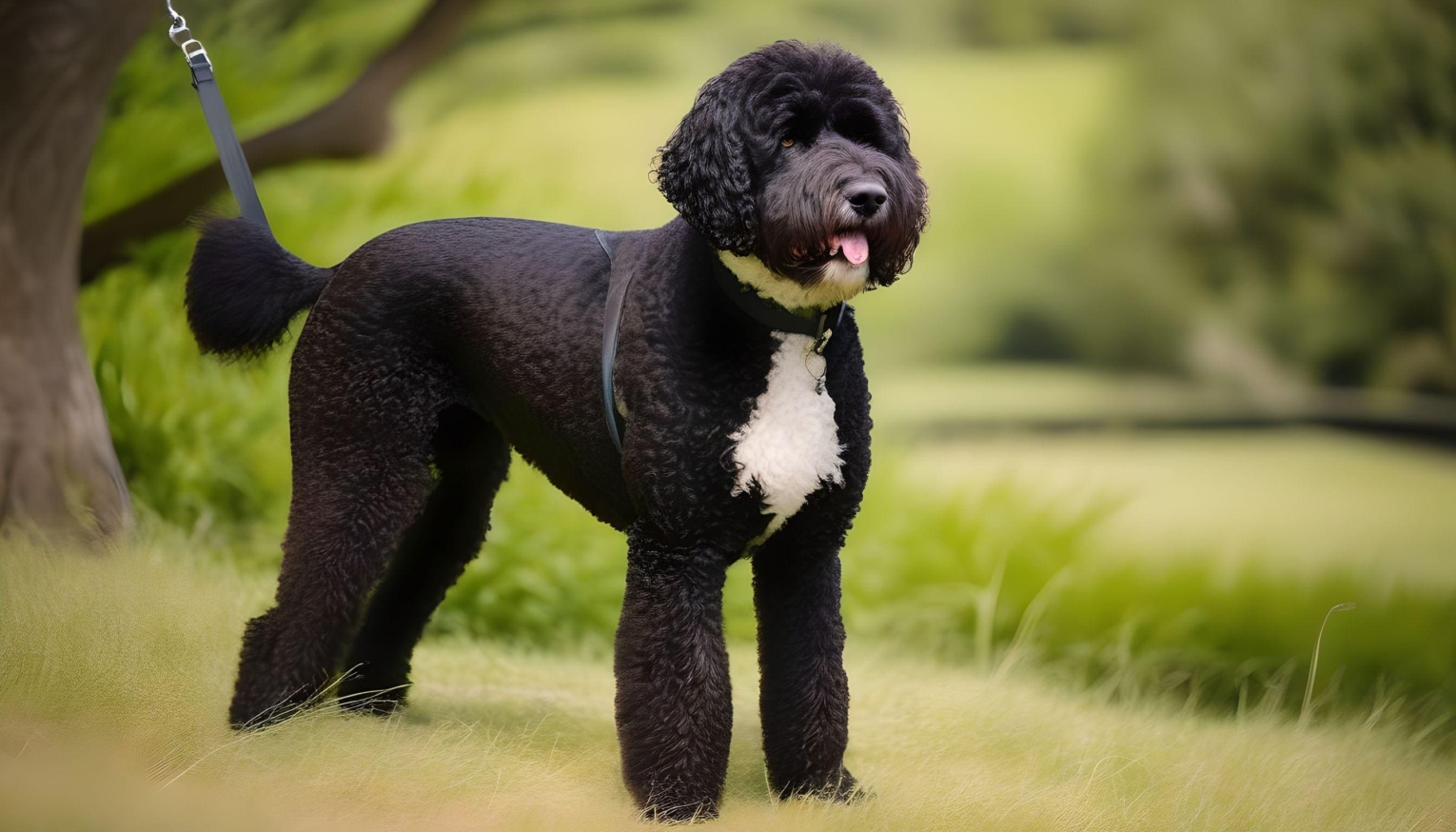
1. Golden Portuguese Water Dog
Golden Portuguese Water Dogs have a coat that ranges from light to deep golden hues. Their fur can have various shades of gold, giving them a radiant and sunny appearance. While not as common as some other colors, golden Porties are undeniably striking, and their coat can vary from a shimmering, pale gold to a richer, deeper tone.
2. Brown Portuguese Water Dog
Brown Portuguese Water Dogs, also referred to as liver-colored, display a lovely and warm chocolate or liver hue. Their coat can vary in intensity, ranging from a lighter brown to a deeper, richer shade. The brown coat of these Porties adds a unique and earthy appeal to their overall appearance.
3. White Portuguese Water Dog
White Portuguese Water Dogs possess a pristine and pure white coat. These dogs often have a solid white appearance, which is quite striking and lends them an elegant and regal look. Their snowy white fur is a favorite among many Water Dog enthusiasts.
4. Black Portuguese Water Dog
Black Portuguese Water Dogs boast a solid black coat that is sleek and glossy. This color is one of the most common among Porties and gives them a striking and distinguished appearance. Their black coat is often associated with the traditional image of a Water Dog.
5. Chocolate Portuguese Water Dog
Chocolate Water Dogs feature a luscious, deep brown coat, often resembling dark chocolate. The chocolate color can vary in shade, giving each dog a unique and delectable appearance. This hue is beloved by many who appreciate the rich and warm tones it brings to the breed.
Portuguese Water Dog Mix
Portuguese Water Dog mixes are the offspring of a Portuguese Dog crossed with another breed, combining traits from both parent breeds. The specific characteristics can vary widely depending on the mix.
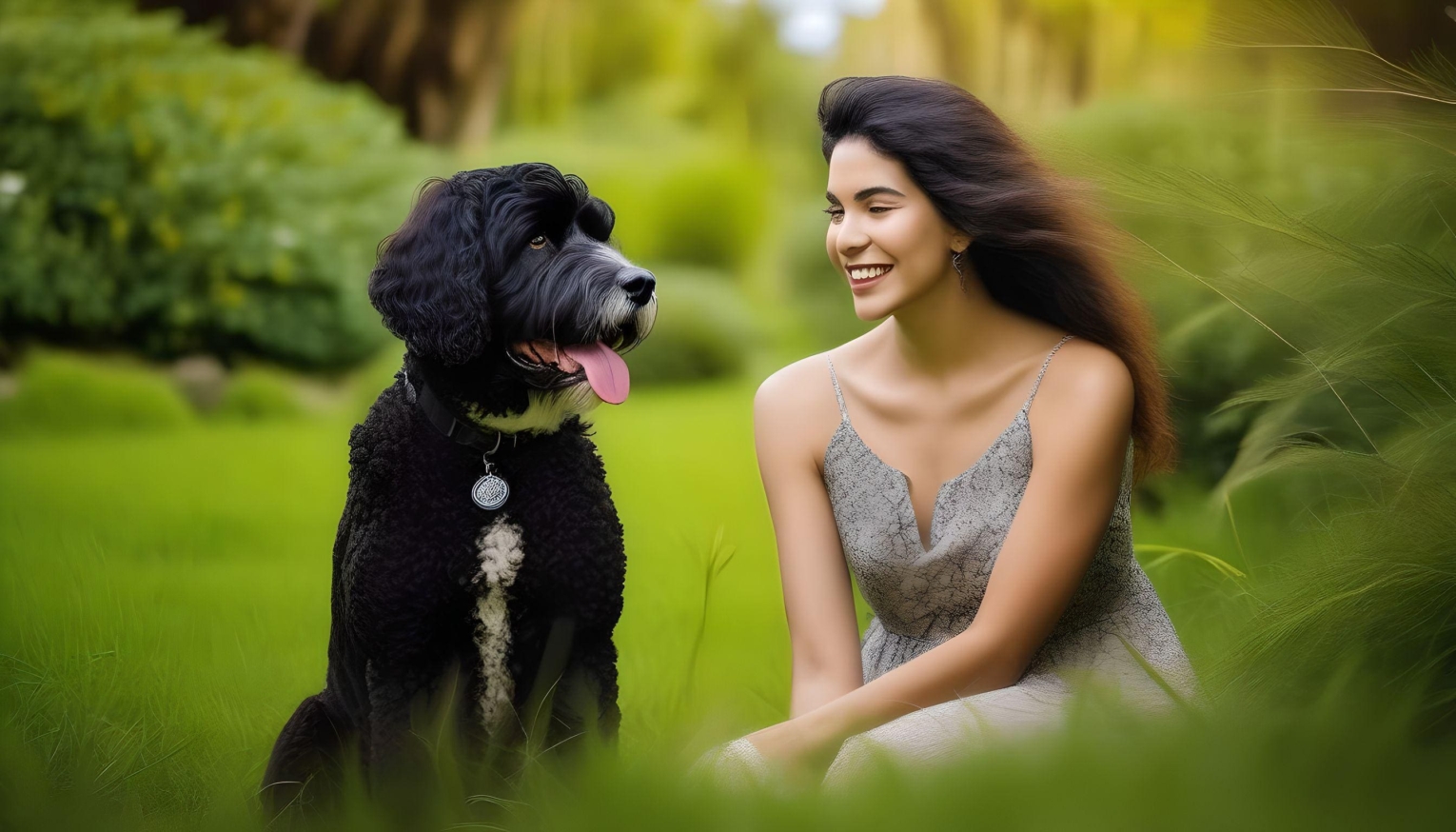
Portuguese Water Dog Poodle Mix
The Portuguese Water Dog Poodle mix, often referred to as the “Portuguese Dogoodle,” is a friendly and loyal hybrid breed resulting from the crossbreeding of a Water Dog with a Poodle. These dogs come in various coat types and colors and generally exhibit a combination of qualities from their parent breeds, making them delightful and unique companions.
History of Portuguese Water Dog
The history of the Portuguese Water Dog dates back to Portugal, where it was originally bred for assisting fishermen. These dogs played a crucial role in tasks like retrieving nets, delivering messages between ships, and herding fish into the nets. Their exceptional swimming abilities, strong work ethic, and intelligence made them invaluable to Portuguese fishermen.
Appearance of Portuguese Water Dog
Portuguese Water Dogs are characterized by their curly or wavy coat, which is often hypoallergenic. They have expressive round eyes and friendly faces, giving them an approachable and endearing appearance. There are two coat varieties: one with tight, dense curls and the other with wavy, more loosely curled fur.
Portuguese Water Dog Temperament
Portuguese Dogs are known for their friendly, outgoing, and playful nature. They are highly adaptable and form strong bonds with their owners. These dogs are intelligent and eager to please, which makes them relatively easy to train. However, they can also be quite independent, so consistent and positive reinforcement-based training is essential.
Behaviour of Portuguese Water Dog
The behavior of Portuguese Dogs is influenced by their working heritage. They are energetic and require regular exercise to stay happy and healthy. Their love for water-related activities is a prominent aspect of their behavior, but they also enjoy playing fetch and running. These dogs are loyal and make excellent family pets due to their friendly and affectionate nature.
Portuguese Water Dog Hypoallergenic
Portuguese Water Dogs are considered a hypoallergenic breed. Their curly or wavy coat traps loose hair and dander, reducing the amount of allergens released into the environment. While no dog is entirely hypoallergenic, Water Dogs are often a suitable choice for individuals with allergies.
Are Portuguese Water Dogs Good For First Time Owners
Portuguese Water Dogs can be good for first-time owners, but they do require an owner who can meet their exercise and training needs. Their intelligence and independent nature mean that they respond well to positive reinforcement-based training, but consistency and patience are key. For first-time owners willing to provide proper care, exercise, and training, Portuguese Dogs can make loving and loyal companions. However, they may not be the best choice for those who can’t commit to their exercise and grooming requirements.

Portuguese Water Dog Price
The price of Portuguese Water Dogs can vary significantly in both the USA and India. In the USA, you can expect to pay anywhere from $2,000 to $4,000 or more for a Portuguese Water Dog from a reputable breeder. In India, the price may range from 50,000 to 1,50,000 Indian Rupees for a Portuguese Water Dog, depending on the breeder’s reputation and the dog’s pedigree.
Portuguese Water Dog Price in United States:
In the United States, Portuguese Water Dogs are sought after for their intelligence and versatility. The price for a Portuguese Water Dog typically ranges from $2,000 to $4,000 or even higher in USA. This variation in cost can be attributed to factors such as the reputation of the breeder, the dog’s pedigree, and geographic location.
Portuguese Water Dog Price in United Kingdom:
Portuguese Water Dogs have gained popularity in the United Kingdom for their affectionate nature and water-related abilities. In the UK, you can expect to pay approximately £1,500 to £2,500 or more for a Portuguese Dog.
Portuguese Water Dog Price in Canada:
In Canada, Portuguese Dogs are admired for their loyalty and friendly disposition. Prices in Canada are on par with those in the USA, ranging from $2,000 to $4,000 or more for Portuguese Water Dog. As with other countries, the price can be influenced by the breeder’s reputation and the dog’s pedigree.
Portuguese Water Dog Price in Australia:
Portuguese Dogs are relatively rare in Australia, contributing to their higher cost. The price for a Portuguese Water Dog in Australia typically ranges from AUD 2,500 to AUD 4,000 or higher. Location and the breeder’s quality play a significant role in determining the price.
Portuguese Water Dog Price In India
In India, Portuguese Water Dogs are becoming increasingly popular as companions. Price for Portuguese Water Dogs can vary widely, generally ranging from 50,000 to 1,50,000 Indian Rupees or more in India. The price is influenced by factors like the breeder’s reputation, the dog’s pedigree, and the growing demand for this unique breed in the Indian market.
Portuguese Water Dog Prices In Major USA and Indian Cities
Here are the approximate prices for Portuguese Water Dogs in major cities in the USA and India:
| City | Average Price in USA (USD) | Average Price in India (INR) |
|---|---|---|
| New York City | $2,000 – $4,000+ | ₹50,000 – ₹1,50,000+ |
| Los Angeles | $2,000 – $4,000+ | ₹50,000 – ₹1,50,000+ |
| Chicago | $2,000 – $4,000+ | ₹50,000 – ₹1,50,000+ |
| Houston | $2,000 – $4,000+ | ₹50,000 – ₹1,50,000+ |
| Phoenix | $2,000 – $4,000+ | ₹50,000 – ₹1,50,000+ |
| Dallas | $2,000 – $4,000+ | ₹50,000 – ₹1,50,000+ |
| San Francisco | $2,000 – $4,000+ | ₹50,000 – ₹1,50,000+ |
| Seattle | $2,000 – $4,000+ | ₹50,000 – ₹1,50,000+ |
| Mumbai (India) | N/A | ₹50,000 – ₹1,50,000+ |
| Delhi (India) | N/A | ₹50,000 – ₹1,50,000+ |
| Bangalore (India) | N/A | ₹50,000 – ₹1,50,000+ |
| Kolkata (India) | N/A | ₹50,000 – ₹1,50,000+ |
| Chennai (India) | N/A | ₹50,000 – ₹1,50,000+ |
Portuguese Water Dog Breeders
Here are Top Breeders for Portuguese Water Dog in different Countries:
| Country | Portuguese Dog Breeders |
|---|---|
| United States | 1. ABC Portuguese Dogs (California) |
| 2. PWD World (New York) | |
| United Kingdom | 1. PWD Palace (London) |
| 2. Thames Valley PWDs (Oxfordshire) | |
| Canada | 1. Canadian PWD Association (Ontario) |
| 2. Maple Leaf Water Dogs (Alberta) | |
| Australia | 1. Down Under Portuguese Dogs (Sydney) |
| 2. Aussie Aqua Dogs (Melbourne) | |
| India | 1. Indian Water Dog Haven (Delhi) |
| 2. Mumbai PWD Pals (Mumbai) |
Portuguese Water Dog Adoption
Portuguese Dog adoption is a compassionate and responsible way to bring one of these wonderful dogs into your life. Here’s a brief overview of the adoption process and what you can expect:
- Research: Start by researching local animal shelters, rescue organizations, and breed-specific rescues that may have Portuguese Dogs available for adoption. Online platforms and websites dedicated to pet adoption can also be valuable resources.
- Contact Rescues: Reach out to these organizations to inquire about available dogs. They can provide you with information about the dogs’ backgrounds, temperaments, and any specific requirements they may have.
- Visit Shelters and Meet Dogs: If you’re near a shelter or rescue organization, visit in person to meet the dogs. Spend time interacting with them to gauge their personalities and see if there’s a connection between you and a potential furry friend.
- Application and Interview: Be prepared to fill out an adoption application. Many rescue organizations will conduct interviews or home visits to ensure you’re a suitable match for the dog and can provide a safe and loving environment.
- Adoption Fee: There is typically an adoption fee, which may vary depending on the organization. This fee often covers the dog’s vaccinations, spaying/neutering, and other veterinary care.

Factors that Affect the Price of Portuguese Water Dog
The price of a Portuguese Water Dog can vary significantly, influenced by several factors:
- Breeder Reputation: Reputable breeders who follow ethical breeding practices and prioritize the health and well-being of the dogs typically charge higher prices for their puppies.
- Pedigree: The lineage and bloodline of a Portuguese Dog play a substantial role in determining its price. Dogs with impressive pedigrees and championship titles in their ancestry often command higher prices.
- Coat Color and Markings: Coat color can affect the price, with some colors considered more desirable than others. Unique markings or coat patterns may also impact the price.
- Location: Prices can vary based on geographic location. Portuguese Dogs may be more expensive in regions with a high cost of living.
- Health Screening: Reputable breeders invest in health testing for their breeding dogs to reduce the risk of genetic health issues. Dogs from health-screened parents are often more expensive.
- Breeding Costs: The expenses incurred by the breeder, including veterinary care, vaccinations, and socialization, are reflected in the price of the puppies.
Monthly Maintenance Cost of Portuguese Water Dog:
The monthly maintenance cost of a Portuguese Water Dog includes various expenses to provide proper care:
- Food: High-quality dog food suitable for their age and activity level.
- Grooming: Regular grooming, including brushing, bathing, and potential professional grooming for their curly or wavy coat.
- Healthcare: Costs for routine veterinary check-ups, vaccinations, flea and tick prevention, and potential emergency medical expenses.
- Training: If needed, expenses for obedience training and socialization classes.
- Supplies: Purchase of dog supplies like collars, leashes, toys, and bedding.
- Insurance: Consider pet insurance to help cover unexpected medical costs.
- Exercise: Budget for physical activities, which may include dog park visits or professional dog walking services.
- Licensing and Registration: Costs associated with licensing and registration as required by local regulations.
- Miscellaneous: Additional expenses for treats, dental care, and other dog-related needs.
Facts about Portuguese Water Dog
Here are some interesting facts about the Portuguese Water Dog:
- Working Heritage: Portuguese Dogs, often called “Porties,” have a rich history of working alongside Portuguese fishermen. They were originally bred to assist with fishing tasks, including retrieving nets, herding fish, and even carrying messages between ships.
- Exceptional Swimmers: These dogs are renowned for their superb swimming abilities. They have webbed feet, which make them excellent swimmers, and they are often referred to as “Cão de Água,” which means “Dog of Water” in Portuguese.
- Hypoallergenic Coat: Portuguese Dogs are known for their hypoallergenic coat, which means they produce fewer allergenic proteins. This makes them a popular choice for people with allergies.
- Two Coat Varieties: They come in two coat varieties: one with tight, dense curls and the other with wavy, more loosely curled fur. Both coat types are considered hypoallergenic.
- Intelligence: These dogs are highly intelligent and eager to learn. They excel in various dog sports and are quick learners when it comes to obedience training.
- Friendly and Loyal: Portuguese Dogs are known for their friendly and outgoing nature. They form strong bonds with their families and are loyal and affectionate companions.
- Adventurous and Energetic: They are an energetic breed and enjoy various activities, especially those involving water. Swimming, fetching, and running are among their favorite pastimes.
- Versatility: In addition to their fishing heritage, Portuguese Dogs have excelled in various roles, including search and rescue, therapy work, and as family pets.
- Health and Longevity: They are generally a healthy breed, with a typical lifespan of 10 to 14 years. Like all breeds, they may be prone to certain genetic health issues, including hip dysplasia and progressive retinal atrophy.
- First Dog in the White House: The Portuguese Dog gained international attention when Bo and Sunny, two Water Dogs, became the First Dogs of the United States during the Obama administration.

Pros and Cons of Portuguese Water Dog
Some common pros and cons of owning a Portuguese Water Dog:
| Pros of Portuguese Water Dog | Cons of Portuguese Water Dog |
|---|---|
| Friendly and Loyal Nature | Energetic and Requires Regular Exercise |
| Highly Intelligent and Trainable | Independent Streak Can Be Challenging for Novice Owners |
| Hypoallergenic Coat | Grooming Needs Can Be Time-Consuming |
| Excellent Swimmers | May Exhibit Separation Anxiety if Left Alone |
| Versatile and Adaptable | Prone to Genetic Health Issues (e.g., Hip Dysplasia) |
| Good with Children and Families | High Demand and Cost from Reputable Breeders |
| Suitable for Active Lifestyles | Water-Related Activities May Not Be Available in All Areas |
| Strong Work Ethic | Requires Socialization to Prevent Shyness or Aggression |
| May Excel in Dog Sports and Activities | Can Be Strong-Willed and Stubborn in Training |
| Highly Affectionate and Bonded with Owners | Requires Mental Stimulation and Puzzle Toys to Prevent Boredom |
Portuguese Water Dog Grooming
Grooming a Portuguese Dog is an important aspect of their care, as their curly or wavy coat requires regular attention to keep them healthy and looking their best. Here are some key points to consider when it comes to Portuguese Dog grooming:
- Brushing: Regular brushing is essential to prevent matting and tangling of the dense, curly coat. Brush your Portuguese Dog at least a few times a week, and more often during shedding seasons. Use a slicker brush or a pin brush to reach the undercoat.
- Bathing: Bathe your Water Dog as needed, typically every 6-8 weeks or when they get dirty. Use a dog-specific shampoo to maintain the natural oils in their coat. Ensure thorough rinsing to avoid skin irritation.
- Drying: After a bath or swimming, be sure to dry your dog completely, as their dense coat can trap moisture close to the skin. You can use a hairdryer on a low heat setting to speed up the drying process.
- Professional Grooming: Many Water Dog owners opt for professional grooming services, especially if they want specific hairstyles or trims. Professional groomers are experienced in working with the unique characteristics of this breed’s coat.
- Coat Clipping: Some owners prefer to keep their Portuguese Dogs’ coats shorter for easier maintenance. Clipping is a personal choice and can make grooming less time-consuming.
- Ear Care: Check and clean your dog’s ears regularly to prevent infections. Their floppy ears can trap moisture, making them more prone to issues.
- Nail Trimming: Keep their nails trimmed to a safe length to avoid discomfort and potential injuries. If you’re unsure how to do this, a professional groomer or veterinarian can help.
- Dental Care: Dental hygiene is essential for their overall health. Brush your dog’s teeth regularly and provide dental chews or toys to maintain oral health.
- Eye Care: Portuguese Dogs can be prone to tear staining. Wipe their eyes regularly to prevent staining and check for any signs of eye irritation.
- Hygiene During Water Activities: After swimming or engaging in water-related activities, rinse your dog thoroughly to remove salt or chlorine from their coat. These substances can be drying to their skin and fur.
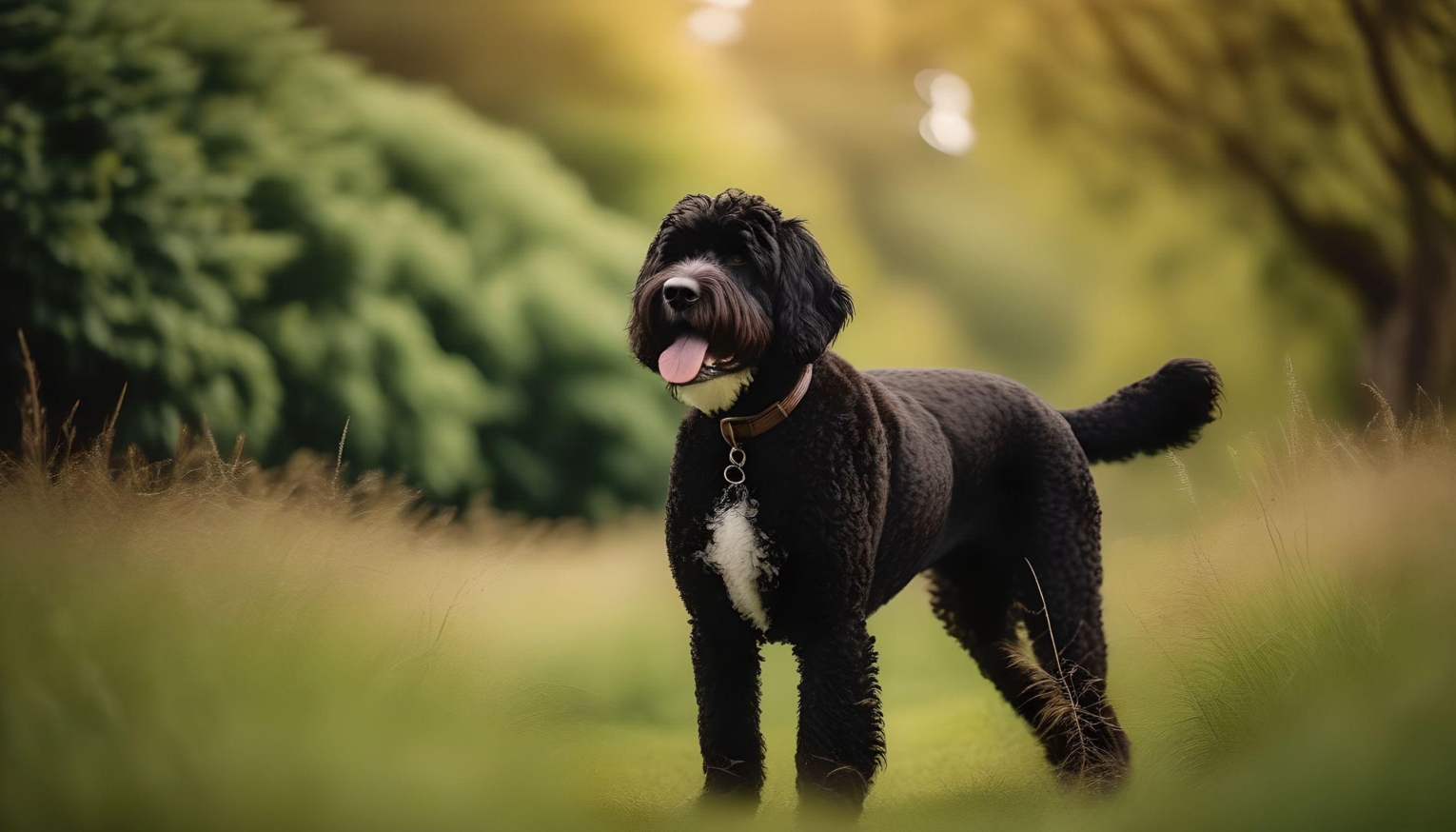
Care Tips for Portuguese Water Dog
Caring for a Portuguese Water Dog involves providing the right environment, attention, and maintenance to ensure their well-being and happiness. Here are some essential care tips for Portuguese Dogs:
- Exercise and Mental Stimulation: Portuguese Dogs are an active breed that thrives on physical and mental stimulation. Provide daily exercise, which can include swimming, running, fetching, and interactive play. Mental stimulation through puzzle toys and training sessions is equally important.
- Socialization: Start socializing your Portuguese Water Dog from a young age. Expose them to various people, pets, and environments to ensure they grow up to be well-adjusted and confident.
- Grooming: Regular grooming is essential to maintain their curly or wavy coat. Brushing at least a few times a week helps prevent matting. Bathing should be done as needed, typically every 6-8 weeks. Consider professional grooming services if you prefer specific hairstyles.
- Hypoallergenic Coat Care: Portuguese Dogs have hypoallergenic coats, making them suitable for allergy sufferers. Regular grooming and brushing help reduce allergen buildup. Keep the coat clean and well-maintained to minimize allergens.
- Health Checkups: Schedule regular veterinary checkups to monitor your dog’s health. Ensure they are up to date on vaccinations and receive preventive treatments for parasites.
- Dental Care: Dental hygiene is crucial. Brush your dog’s teeth regularly to prevent dental issues. Provide dental chews and toys to promote healthy gums and teeth.
- Nutrition: Feed your Portuguese Dog a balanced and high-quality dog food. Consult with your veterinarian to determine the best diet based on their age, activity level, and any specific dietary needs.
- Training and Obedience: These dogs are highly intelligent and eager to please. Consistent, positive reinforcement-based training is essential to ensure they become well-behaved companions. Enroll in obedience classes for socialization and training.
- Safety Around Water: Portuguese Dogs are strong swimmers, but always supervise them around water to prevent accidents. Ensure they have a safe and controlled environment for swimming.

Do Portuguese Water Dogs Shed
Portuguese Water Dogs are known for their hypoallergenic coat, which means they shed very little. While no dog is entirely hypoallergenic, their curly or wavy coat traps loose hair, reducing the release of allergens into the environment. This makes them a suitable choice for allergy sufferers.
Portuguese Water Dog Haircut
The Portuguese Water Dog’s coat can be trimmed or styled in various ways to suit the owner’s preference. Some owners choose to keep their coat shorter for easier maintenance, while others opt for a more traditional and natural look. Professional groomers can help with specific haircuts.
Portuguese Water Dog Lion Cut
A “Lion Cut” is not a common style for Portuguese Water Dogs. It typically involves shaving the coat close to the skin, leaving only a tuft of fur at the end of the tail and a mane around the head, resembling a lion’s appearance. This haircut is more commonly associated with certain cat breeds.
Portuguese Water Dog Wavy
Portuguese Water Dogs have wavy or curly coats. The specific curl pattern can vary between individuals, but both coat types are considered hypoallergenic.
Portuguese Water Dog Shaved
Some owners choose to have their Portuguese Dogs shaved for easier maintenance, especially during hot weather. Shaving can help keep the dog cooler, but it’s essential to consult with a professional groomer to ensure the coat is shaved correctly to avoid skin issues.
Portuguese Water Dog Retriever Cut
The “Retriever Cut” is a grooming style that trims the coat shorter but leaves it longer on the ears, legs, and tail, somewhat resembling a retriever’s appearance. It’s a practical choice for those who want a tidier coat without going completely short.
Portuguese Water Dog Size
Portuguese Water Dogs are medium-sized dogs. Males typically stand between 20 to 23 inches (51-58 cm) at the shoulder, while females are slightly smaller, ranging from 17 to 21 inches (43-53 cm).
Portuguese Water Dog Weight
The weight of a Portuguese Water Dog can vary, with males weighing between 42 to 60 pounds (19-27 kg), and females weighing slightly less, ranging from 35 to 50 pounds (16-23 kg).
Full Grown Portuguese Water Dog
Portuguese Water Dogs reach their full adult size at around 12 to 18 months. By this age, they are considered fully grown and have developed their mature appearance.
Health Issues of Portuguese Water Dog
Portuguese Water Dogs are generally a healthy breed, but like all dogs, they can be prone to certain genetic health issues. Responsible breeding and regular veterinary care are essential to minimize these risks. Some of the health issues that can affect Portuguese Dogs include:
- Hip Dysplasia: This is a hereditary condition in which the hip joint doesn’t develop properly, leading to arthritis and pain. Responsible breeders screen their dogs for hip dysplasia to reduce the risk.
- Progressive Retinal Atrophy (PRA): PRA is a group of genetic diseases that affect the retina, leading to vision loss and eventually blindness. Regular eye examinations are crucial to detect PRA early.
- Goniodysgenesis and Glaucoma: Some Portuguese Dogs may be prone to goniodysgenesis, which can lead to glaucoma, a condition that increases intraocular pressure and can result in vision loss.
- Storage Disease: Portuguese Dogs may be susceptible to storage diseases, such as GM1 gangliosidosis and mucopolysaccharidosis. Genetic testing can identify carriers and help avoid breeding affected dogs.
- Hypothyroidism: This is a common endocrine disorder that can affect the breed, leading to symptoms like weight gain, lethargy, and skin issues. It can often be managed with medication.
- Heart Issues: Mitral valve disease and dilated cardiomyopathy are heart conditions that can affect Portuguese Dogs. Regular cardiac evaluations are essential for early detection.
- Juvenile Dilated Cardiomyopathy (JDCM): This is a genetic condition that affects the heart muscles of young dogs, often leading to heart failure. Genetic testing is available to identify carriers.
- Allergies: Some Portuguese Dogs may develop skin allergies, often caused by environmental factors or food sensitivities. Proper diet and allergy management can help.

Portuguese Water Dog Lifespan
The average lifespan of a Portuguese Water Dog is typically around 10 to 14 years. With proper care, a healthy diet, regular exercise, and regular veterinary check-ups, these dogs can enjoy a long and fulfilling life. Genetics, responsible breeding, and early detection and management of any potential health issues also play a significant role in determining their lifespan.
Food for Portuguese Water Dog
Popular Food Options for Portuguese Water Dogs:
| Food Type | Description |
|---|---|
| High-Quality Dog Food | A well-balanced, commercial dog food that meets the nutritional needs of your Portuguese Water Dog. Look for options with high protein content and limited fillers. |
| Raw Diet | Some owners prefer a raw diet consisting of raw meat, bones, and vegetables. Ensure proper balance and consult with a veterinarian for guidance. |
| Homemade Dog Food | Homemade meals can be an option, but it’s essential to consult with a veterinarian or canine nutritionist to ensure proper nutrition and portion control. |
| Supplements | Supplements like fish oil for coat health and joint supplements may be recommended by a vet for specific health needs. |
| Special Dietary Needs | Some Portuguese Water Dogs may require specialized diets due to allergies or health issues. Consult with a veterinarian for guidance on suitable food options. |
Names for Portuguese Water Dog
Popular Names for Portuguese Water Dog:
| Name | Description |
|---|---|
| Max | A strong and popular dog name. |
| Bella | A name that means “beautiful” in Italian. |
| Rocky | Ideal for a robust and active dog. |
| Luna | A name inspired by the moon. |
| Daisy | A cheerful and friendly name. |
| Finn | A name with an adventurous feel. |
| Nala | Inspired by the character in “The Lion King.” |
| Scout | Perfect for an explorer and water-loving dog. |
| Zoe | A name that exudes vitality and energy. |
| Maverick | Ideal for a dog with a free-spirited personality. |
Portuguese Water Dog Video
Conclusion:
In conclusion, the Portuguese Water Dog is a unique and versatile breed with a rich history of working alongside fishermen. Known for their hypoallergenic coat, friendly nature, and exceptional swimming abilities, these dogs make wonderful companions for active families and individuals. With proper care, exercise, and grooming, Portuguese Water Dogs can thrive and bring joy to their owners for many years. Their intelligence, loyalty, and adaptability continue to make them a beloved choice for dog lovers around the world.
Frequently Asked Questions on Portuguese Water Dog:
-
What is the origin of the Portuguese Water Dog?
The Portuguese Water Dog, also known as “Cão de Água,” has a long history as a working dog in Portugal. They were originally bred to assist fishermen in various water-related tasks.
-
Are Portuguese Water Dogs good for families with children?
Yes, Portuguese Water Dogs are generally excellent family dogs. They are known for their friendly and loyal nature, making them great companions for children. However, like all dogs, proper socialization and supervision are important.
-
Do Portuguese Water Dogs require a lot of exercise?
Yes, Portuguese Water Dogs are an active and energetic breed. They require regular exercise to stay healthy and happy. Daily walks, playtime, and activities like swimming are essential to meet their exercise needs.
-
Are Portuguese Water Dogs hypoallergenic?
Yes, Portuguese Water Dogs are considered hypoallergenic. Their curly or wavy coat produces fewer allergenic proteins and is less likely to trigger allergies in people who are sensitive to pet dander.
-
What is the typical size of a Portuguese Water Dog?
Portuguese Water Dogs are medium-sized dogs. Males typically stand between 20 to 23 inches at the shoulder, and females are slightly smaller, ranging from 17 to 21 inches.
-
How often do Portuguese Water Dogs need grooming?
Portuguese Water Dogs require regular grooming due to their curly or wavy coat. Brushing a few times a week and bathing every 6-8 weeks is common. Some owners may choose professional grooming services for specific hairstyles.
-
Do Portuguese Water Dogs get along with other pets?
Portuguese Water Dogs can get along well with other pets when properly socialized. They tend to have a friendly and sociable nature, but early introductions and supervision are important.
-
What is the lifespan of a Portuguese Water Dog?
The average lifespan of a Portuguese Water Dog is typically around 10 to 14 years. Proper care, regular veterinary check-ups, and a healthy lifestyle can contribute to a longer life.
-
Are Portuguese Water Dogs good for first-time dog owners?
While Portuguese Water Dogs are known for their intelligence and friendly nature, they can be strong-willed and require consistent training. They can be suitable for first-time owners with dedication to training and socialization.
-
Do Portuguese Water Dogs have specific health concerns?
Yes, Portuguese Water Dogs may be prone to certain health issues like hip dysplasia, progressive retinal atrophy, and heart conditions. Responsible breeding and regular vet check-ups are crucial to monitor and address these concerns.
Recommended –
- Old English Sheepdog | Breed Profile, Prices, 10 Facts, Care Tips, Health Issues
- Black Labrador | Breed Profile, Prices, 6 Type, Facts, Care Tips, Health
- Lhasa Apso Dog | Breed Profile, Price, 7 Types, Facts, Care Tips, Health
- 13+ Best Dog For Home in India with Price and other Expenses
- Top 40+ Black Dog Breeds all Over the World in – 2023
- Top 15 Low Shedding Dogs Breed – You Can Buy in 2023


























